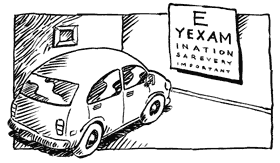
Everyone experiences a decline in vision at some point in their lives. It's a natural part of aging and it starts surprisingly early mid to late 20s. Gradually, the amount of light needed to see objects in low light increases and our peripheral vision narrows.
By their mid 40s most people are affected by presobyopia, a condition caused by a hardening of the lens. Presobyopia is what makes people wish they had longer arms to read the newspaper.
Other eye conditions such as cataracts, glaucoma, macular degeneration and retinal changes become more common with age.
The good news is most people don't have to stop driving when their eyesight begins to decline. Corrective lenses and other treatments can compensate for age-related vision changes. With proper care and an understanding of the changes taking place, most of us can keep driving far into our senior years.
The older we get, the more light we need to see well. Headlight glare and sunlight can be more bothersome. Reaction time slows. Peripheral awareness may be reduced. Color distinction may diminish. And refocusing quickly to different distances becomes harder.
Physical strength and flexibility also decline with age, which can affect the ability to drive safely. Medications and entrenched poor driving habits can also make driving more dangerous.
Accepting these changes and adjusting properly can help make driving a safe option. Here are a few tips to help maintain adequate vision as you age:
- Have regular eye exams. Detecting problems early may make them easier to correct.
- Have proper glasses for both day and night driving. They may be different!
- Keep your glasses clean.
- Don't wear sunglasses or tinted glasses at night.
- Limit night driving to well-lighted roads.
- Keep headlights and windshields clean.
- Avoid frames on glasses with wide temple pieces they can block side vision.
- Take a driver refresher course.
Thank you to the New Jersey Optometric Association for information used in this article.
An eye-opening study
In a study of drivers aged 68 and over who were cited at fault in an automobile crash, those who had symptoms of depression, memory problems or a recent history of back pain posed a higher risk of being involved in a crash than those with vision impairments.
Let us help
If you have questions about any of information in this article, please give us a call.
We're here to help you.













